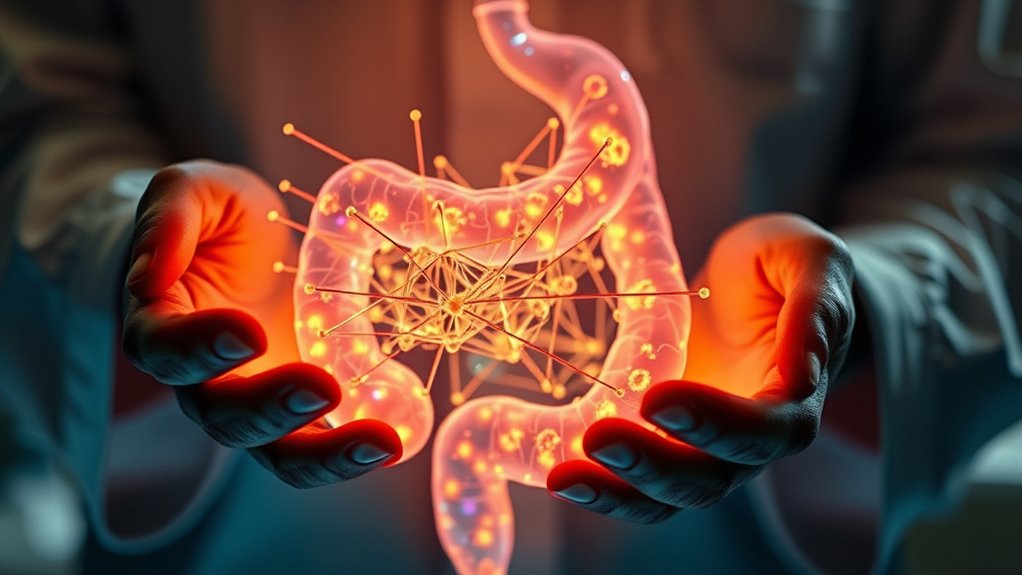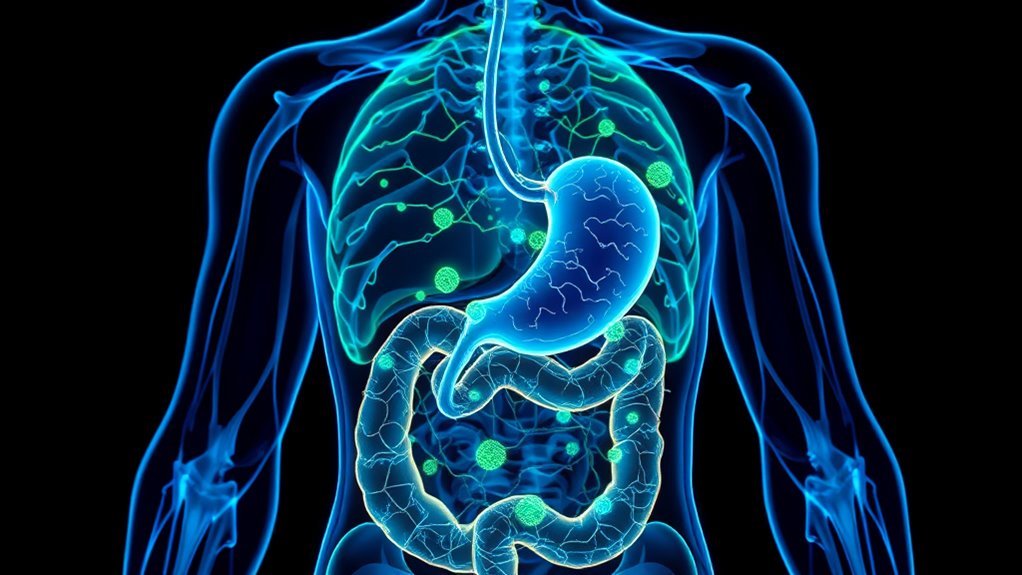To optimize your gut-brain axis for better mental health, focus on regular intake of fermented foods like yogurt, sauerkraut, and kimchi, which introduce beneficial probiotics. Consider probiotic supplements with diverse strains to boost your microbiome’s health. Consistent habits nurture your gut bacteria, helping them communicate effectively with your brain and influence your mood positively. Keep exploring how targeted biohacks can support your emotional resilience and mental clarity down the line.
Key Takeaways
- Supporting gut microbiome diversity through fermented foods and probiotics enhances communication along the gut-brain axis, promoting mental health.
- Regular intake of probiotics can help restore microbial balance, reducing inflammation and improving mood stability.
- Personalized microbiome approaches are essential due to individual differences in gut bacteria composition.
- Maintaining a healthy gut microbiome influences neurotransmitter production, such as serotonin and GABA, crucial for emotional well-being.
- Consistent biohacking strategies, including diet and supplementation, foster mental resilience by optimizing gut-brain communication.

The gut-brain axis is a complex communication network that links your digestive system and your brain, allowing them to influence each other’s functions. This connection means that what happens in your gut can directly impact your mental health, mood, and cognitive performance. To optimize this system, you can start by paying close attention to your microbiome—the community of microorganisms living in your gut. A balanced microbiome supports healthy neurotransmitter production, reduces inflammation, and promotes overall well-being. Incorporating fermented foods into your diet is a simple yet effective way to nurture these beneficial bacteria. Items like yogurt, kefir, sauerkraut, kimchi, and kombucha are rich in live probiotics that help maintain microbial diversity. These foods can boost your gut’s health by introducing new strains of beneficial bacteria, which in turn can positively influence your mood and mental clarity.
In addition to fermented foods, probiotic supplements offer a targeted approach to enhance your gut microbiome. These supplements contain concentrated strains of beneficial bacteria designed to improve gut health quickly and reliably. When choosing a probiotic supplement, look for ones with diverse strains and a high CFU (colony-forming units) count to maximize benefits. Regularly taking probiotics can help restore or maintain a healthy balance of microbes, especially if you’ve recently taken antibiotics or have digestive issues. A well-balanced microbiome not only supports digestion but also produces neuroactive compounds like serotonin and gamma-aminobutyric acid (GABA), which regulate your mood and reduce anxiety. Additionally, research suggests that the effectiveness of probiotics can be influenced by the type of technology used, such as DLP or LCD, which impacts the accuracy of visual information processing in related applications.
Biohacking your microbiome with fermented foods and probiotic supplements isn’t just about digestion; it’s about nurturing a foundation for mental resilience. When your gut bacteria are thriving, they’re better equipped to communicate with your brain, influencing stress levels and emotional stability positively. However, it’s crucial to approach this process consistently. Incorporate fermented foods into your meals daily or a few times a week, and consider adding a high-quality probiotic supplement to your routine. Listen to your body’s responses and adjust accordingly. Remember, individual microbiomes are unique, so what works for someone else might not be ideal for you. With patience and consistency, you can harness the power of your microbiome to support mental health, clarity, and overall well-being through the gut-brain axis.
Frequently Asked Questions
Can Probiotics Directly Improve Mental Health Symptoms?
Probiotic strains can directly improve mental health symptoms through mental health supplementation, but results vary. When you choose specific strains like Lactobacillus and Bifidobacterium, they may help reduce anxiety and depression by supporting your gut-brain axis. Incorporating these probiotics into your routine might enhance your mood and cognitive function, but consistency and selecting the right strains are key. Always consult with a healthcare professional before starting new mental health supplementation.
How Quickly Can Gut Microbiome Changes Affect Mood?
You might notice rapid mood improvements within a few days to weeks after changing your gut microbiome. The timing of microbiome shifts varies, but some people experience positive effects quickly due to the gut-brain connection. Coincidentally, this swift impact highlights how sensitive your mood can be to gut health. Keep consistent with probiotics and diet changes, and you could see noticeable improvements sooner than you expect.
Are There Risks Associated With Extreme Biohacking Practices?
Yes, there are risks with extreme biohacking practices. You might face ethical considerations, especially if experiments harm your health or involve unapproved interventions. Long-term safety is uncertain, as some methods could disrupt your microbiome or cause unforeseen health issues. Always research thoroughly, consult professionals, and prioritize safety over rapid results. Avoid shortcuts, and remember that sustainable, evidence-based approaches are safer for your mental and physical health.
Does Diet Alone Significantly Influence the Gut-Brain Connection?
Diet impact is significant when it comes to the gut-brain connection, but it’s not the only factor. You can influence your microbiome through nutrient diversity, including fiber, fermented foods, and a variety of plant-based options. While diet alone helps improve gut health and mental clarity, combining it with other lifestyle changes maximizes the benefits. So, focus on a balanced, nutrient-rich diet to support your gut-brain health effectively.
Can Gut Health Impact Neurological Diseases Beyond Mood Disorders?
They say, “You are what you eat,” and gut health can indeed influence neurological diseases beyond mood disorders. You can impact neurodegenerative mechanisms and immune modulation through your microbiome. A healthy gut supports brain function, potentially reducing risks or progression of conditions like Parkinson’s or Alzheimer’s. By prioritizing gut health, you’re actively supporting your nervous system and immune responses, making it a crucial component of overall neurological health.
Conclusion
By tending to your gut, you gently nurture the whispers between your mind and microbiome. When you listen closely, you may find subtle shifts guiding you toward greater balance and calm. Small choices—what you eat, how you relax—become the quiet melodies that harmonize your mental well-being. Embrace this delicate dance, knowing that tending your gut’s whispers can softly lead you toward brighter days and a more peaceful mind.








